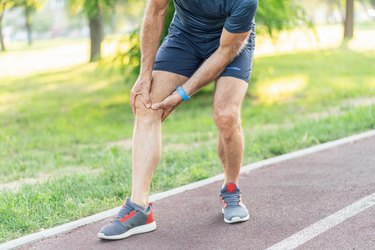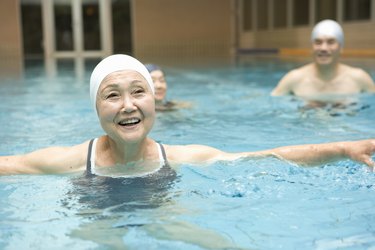
In youth, we've all felt a little "weak in the knees" from time to time — like when we meet someone special or land a life-changing job opportunity. But as we get older, the expression takes on a whole new meaning as our knees literally grow wobbly.
While it's impossible to completely prevent the effects of aging, there are a ton of tactics you can try to temper time's impact on your knees and keep your knees healthy as you age.
Video of the Day
Video of the Day
We chatted with Ashley V. Austin, MD, sports medicine physician at the Hospital for Special Surgery, to find out what causes knee weakness in seniors and what you can do to safeguard knee strength and stability as you age.
1. Your Cartilage Deteriorates
When your knee cartilage is healthy, you probably don't give it much thought. This crucially essential connective tissue is responsible for a range of functions: it absorbs shock, reduces friction and supports the structures in your knee (and many other body parts), according to the Cleveland Clinic.
Over the years, though, everyday wear and tear can do a number on your cartilage. And when it withers, your knees will grow weaker. "As cartilage deteriorates, we have less cushion and support within our joint," Dr. Austin says.
Without healthy cartilage to bolster your knees, they won't be as robust or function as well as they used to in your younger years.
And as a result, "we have to rely more on the surrounding and supporting muscle groups to keep heavy loading forces off of the joint," Dr. Austin says.
But over time, these compensations can lead to other issues like muscle imbalances and, eventually, even injury.
Fix It
“Regular exercise and strength training of the lower body (with a concentration on strengthening the hips) can help,” Dr. Austin says. “The hip muscles are some of our strongest muscle groups, and they help with changes in balance and gait that can happen with cartilage wear.”
2. Your Muscles Are Weaker
"Muscle atrophy happens as we age," Dr. Austin says. Yep, you'll likely lose up to 5 percent of your muscle mass every decade after the age of 30, according to Harvard Health Publishing.
Known as sarcopenia, this age-related muscle loss has major consequences for your knees.
"When we are younger, we can complete activities even if all of our supportive muscles are not activating at once," Dr. Austin says. But with advanced age, our strength decreases.
Think of it like this: As the muscles that surround your knee weaken, they no longer have the capacity to support the joint. Not only does this equate to more stress on the knees, but it also lowers the threshold for injury, Dr. Austin says.
Fix It
To maintain good muscle recruitment and activation, “your muscle support system needs to be more and more efficient to prevent injury the older you get,” Dr. Austin says.
“Therefore, it is imperative that we keep exercising and strength training throughout life to counter these changes and to prevent injury,” she says.
Physical therapy — which can help you target weaknesses and improve mobility — can also be useful for offsetting the effects of sarcopenia.
Consuming enough protein can also help preserve muscle mass and keep your knees healthy. Older adults should aim to get 1 to 1.3 grams of protein per kilogram of body weight, per Harvard Health Publishing. For instance, if you weigh 150 pounds, you’d need between 68 and 88 grams of protein daily.
3. Your Bones Become Less Dense
In your senior years, your bone strength starts to dip. Case in point: once you turn 50, not only does your body break down old bone faster than it forms new bone, but bone loss also kicks into high gear, especially during menopause, according to Johns Hopkins Medicine.
In severe cases, too much bone loss can lead to osteoporosis, a bone disease characterized by a decrease in bone mineral density and bone mass.
But diminished bone density is bad news for your knees. "Less bone density means less structural support for cartilage, muscle, tendons and ligaments," Dr. Austin says. Taken together, all of these things can exponentially weaken your knees and make you more prone to falls and injuries like bone fractures.
Fix It
Optimizing low impact, load-bearing exercises can help keep your bones healthy. Specifically, “resistance training with bands is a great way to work on muscle strengthening in people with low bone density who may not be able to do more hig-impact strength training exercises,” Dr. Austin says.
Additional ways to protect your bone mineral density include, per Johns Hopkins Medicine:
- Get enough calcium, potassium and vitamin D in your diet
- Pack protein on your plate
- Limit caffeine and alcohol
- Quit smoking
4. You’re Too Sedentary
In your golden years, you might be looking forward to slowing down your pace and kicking up your feet. But moving less and sitting more won't do your knees much good.
When you spend too much time on the couch, "your musculoskeletal system becomes deconditioned and weak," Dr. Austin says. And this includes your knees.
In particular, a lack of activity can shrivel and harden cartilage, according to the State Government of Victoria's Department of Health. As we know, healthy cartilage is necessary for strong knees.
Additionally, motion is lotion for the knees. Indeed, physical activity promotes the flow of synovial fluid (i.e., the fluid inside your joints that keeps them lubricated), per the State Government of Victoria's Department of Health.
So when you're inactive, you have less lubricant, which translates to creakier, weaker knees.
"Subsequently, even everyday tasks and activities of daily living can become difficult," Dr. Austin says.
Fix It
Simply put: start moving. “If we don't move it, we lose it,” Dr. Austin says.
“Activity is medicine,” she says. “Adhering to the guidelines for activity (150 minutes of moderate intensity exercise per week) can help to keep the body from being deconditioned.”
Even a little movement each day (think: a 10-minute stroll after dinner) can make a big difference when it comes to preserving strength in your knees in older age.
5. You Have Osteoarthritis
While most people experience a certain degree of wear and tear on their knees over the years, some suffer from a more serious deterioration of cartilage. Osteoarthritis (also called degenerative joint disease) involves the breakdown of cartilage, bone and tissues that cause pain, swelling and deformity of the joints, according to the Cleveland Clinic.
"Additionally, pain from [knee] cartilage deterioration can cause muscle inactivation as the body goes into protection mode to prevent injury," Dr. Austin says.
Ironically, though, this may just exacerbate your knee problems. Here's why: When your muscles become inactive, they grow weaker, which may make you feel even more unstable on your feet, she says.
Though osteoarthritis won't affect all older adults, aging is a major factor. Approximately 80 percent of people older than 55 are dealing with some degree of this degenerative condition, per the Cleveland Clinic.
Additional factors also raise your risk of developing osteoarthritis, according to the Cleveland Clinic:
- Having overweight or obesity
- Diabetes
- Elevated cholesterol
- Sex (people assigned female at birth are more susceptible)
- Genetics
Fix It
While certain risk factors are unavoidable, the following things can help counter inflammation and the effects of osteoarthritis in your knees, per the Cleveland Clinic.
- Topical or oral anti-inflammatory medications, such as acetaminophen and/or non-steroidal anti-inflammatories
- Therapeutic injections such as corticosteroids or hyaluronic acid
- Low-impact aerobic exercise (think: walking, biking, swimming)
- Physical therapy to improve strength, flexibility and functional mobility
- Braces and orthotics to support and stabilize damaged joints
- Supplements like glucosamine, chondroitin and fish oil
- Healthy weight management to reduce stress on weight-bearing joints
- Hot and cold treatments
6. You’ve Gained Weight
Put on a few pounds with the passing years? A slower metabolism and a more sedentary lifestyle are often responsible for age-related weight gain.
Unfortunately, having overweight only worsens weak knees.
It makes sense: With more weight to carry, "it is more difficult for your normal musculature to support your body frame and joints," Dr. Austin says. And your knees will have to bear the brunt of the extra load.
Additionally, more stress on the joints can cause an overuse of the surrounding muscles whose function is to protect the knee joints, she says.
Making matters worse, extra weight can heighten your odds of developing degenerative joint disease. That's because, on top of overloading the joints, obesity also produces metabolic and pro-inflammatory effects that contribute to osteoarthritis, especially of the knee, according to the Cleveland Clinic.
Fix It
“Physical therapy can help you strengthen your muscles and adapt to your new weight,” Dr. Austin says.
The physical activity you do in physical therapy can also support healthy weight loss, she adds. Even losing a few pounds can reduce the strain on your joints and help preserve knee function.
A smart strategy might be to focus on effective exercises that are gentle on the joints. For example, “low-impact activities like recumbent biking, walking, elliptical, stair stepper and swimming are good for weight loss,” Dr. Austin says.
7. You’ve Had a Previous Knee Injury
If you have an old knee injury, the area may always feel a little frail and feeble even years later.
That's because after a knee injury, "there can be some side preference or residual weakness that causes a particular pattern of movement," Dr. Austin says.
When this happens, one side of the body usually grows weaker or has less muscle activation than the other, she says. But this can produce more problems such as muscle imbalances, joint instability and eventually cartilage breakdown.
Adding insult to injury (pun intended), former injuries or traumas to your knee can also increase your odds of osteoarthritis.
Fix It
Once again, “physical therapy is a cornerstone for recovery,” Dr. Austin says.
”Additionally, things like evaluations with exercise physiologists can help with restoring appropriate posture, gait mechanics and movement mechanics for activities of daily living and sport in the post-operative period,” she adds.
When Should Someone See a Doctor for Weak Knees?
When left untreated, weak knees may leave you unsteady on your feet. Indeed, knee instability can affect your balance and increase your risk of a fall, according to an August 2016 study published in Arthritis Care & Research.
If your knees feel shaky, don't hesitate to see your doctor who can properly assess your issue and refer you to a specialist.
"Physicians can set you up with physical therapists and exercise physiologists who can evaluate your movement mechanics to determine if there is knee weakness, and if the knee weakness is secondary to another problem that needs to be addressed," Dr. Austin says.
But the best way to nip knee weakness in the bud is to build strong muscles and joints.
Before you have an injury or notice weaknesses and imbalances, prioritize strength training to prevent injury, Dr. Austin says.
- Cleveland Clinic: “Cartilage”
- Harvard Health Publishing: “Preserve your muscle mass”
- Johns Hopkins Medicine: “Osteoporosis: What You Need to Know as You Age”
- State Government of Victoria’s Department of Health: “Ageing - muscles bones and joints”
- Cleveland Clinic: “Osteoarthritis”
- Arthritis Care & Research: “Symptoms of Knee Instability are Risk Factors for Recurrent Falls”


